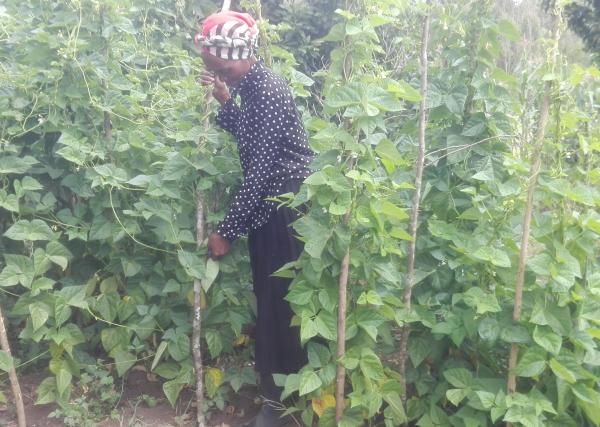Wanjiru Defies Odds To Farm In Kenya’s Harsh Seasons
By Paul Tentena
9 Feb 2023 by The Water Diplomat

NYANDARUA COUNTY, KENYA – Situated just a few kilometers off Kenya’s Sasumua Dam is 58 years old Phillis Wanjiru a mother of four children who has defied all the odds to grow crops throughout the year in rather Kenya’s harsh dry conditions.
The resident of Njabini Township in Nyandarua County on the South End of the Aberdare Mountains, Wanjiru grows Passion Fruits, Cabbages, Strew Berries, Pumpkins, Pawpaws, Guavas and Yams among others.
She uses her home made irrigation means of tapping rainwater and transporting it to a pond, a rather unique idea in the area.
“This is family land. We grow food crops and Cash crops throughout the year with my husband through water harvesting and irrigation,” said Wanjiru.
This was during a visit to her home by a group of East African Science Journalists who were there to see how she has managed to continue with farming despite the harsh and long dry spells in Kenya’s Central Region part without rainfall.
Using the 2.5 acres family land, Wanjiru harvests water from their house during the rain season and through locally modified means, she transports it to a water pond that was dug with the use of polythene bags.
The polythene bags help to keep the water for longer periods of time by preventing evaporation and draining.
It’s from the pond that she collects water that helps her irrigate the 2.5 acres of land to grow the different crops and rare some animals like cattle and sheep.
“I no longer have water stress since I started using water harvesting methods and the borehole.
“In 1993, they stopped us from getting water from Sasumua Dam,” She said.
To supplement her rain harvested water, Wanjiru dug a bore hole that supplies her water for home consumption as well as irrigation for the green house, she set up nearby for seed breeding and germination.
She sells her crops to Nairobi City markets and to the neighborhood of Njabini Township.
The Science Journalists excursion was sponsorsed by Africa 21 and the Water Diplomat.
